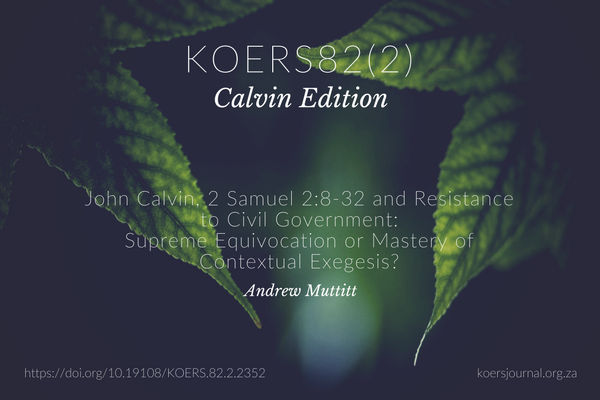Abstract
Abstract
Over the years, it has been the considered view of some scholars that John Calvin regarded popular armed resistance to duly appointed but abusive civil rulers as illegitimate in the world of the 16th century and, by analogy, in the world of today. Instead, they are of the view that the legitimacy of forceful resistance to a tyrannical civil magistrate as subsequently developed by the later Huguenots, Scottish Covenanters and English Parliamentarians was rooted in the thought of Theodore Beza as it allegedly diverged from that of Calvin. They apparently base this view exclusively on a reading of the Institutes 4.20.24-30. This paper examines whether Calvin’s sermons on 2 Samuel, preached in 1562, puts to rest accusations of equivocation raised by the infamous “perhaps” of paragraph 31; and if so, whether they evidence a development in Calvin’s thought which stands in irreconcilable contradiction to the position expressed in the last chapter of the Institutes.
Opsomming
Johannes Calvyn, 2 Samuel 2:8-32 en weerstand teen die burgerlike owerheid: uiterste dubbelsinnigheid of beheersing van kontekstuele eksegese?
Deur die jare was dit die oorwoë mening van kenners dat Johannes Calvyn gewapende weerstand teen die regmatige – hoewel onderdrukkende – owerheid as onwettig in die wêreld van die 16de eeu beskou het, en dat dit daarom ook onwettig vir vandag is. Daarenteen is hulle van mening dat die regmatigheid van gewelddadige weerstand teen die onderdrukkende owerheid, soos dit later deur die Hugenote, Skotse ‘Covenanters’ en Engelse Parlementariërs ontwikkel is, eerder in die denke van Theodore Beza gegrond was, na bewering in afwyking van Calvyn. Oënskynlik word hierdie mening uitsluitend gebaseer op ’n lesing van die Institusie 4.20.24-30.
Hierdie artikel ondersoek of Calvyn se preke oor 2 Samuel, gehou in 1562, die aantyging van dubbelsinnigheid wat deur die berugte “miskien” van paragraaf 31 opgeroep word, kan weerlê. En indien wel, of hierdie preke ’n ontwikkeling in Calvyn se denke aantoon, wat in ’n onversoenbare teenstrydigheid staan met die posisie wat in die laaste hoofstuk van die Institusie ingeneem word.

This work is licensed under a Creative Commons Attribution-NoDerivatives 4.0 International License.
Copyright (c) 2017 Andrew Muttitt


_31.png) https://doi.org/10.19108/KOERS.82.2.2352
https://doi.org/10.19108/KOERS.82.2.2352